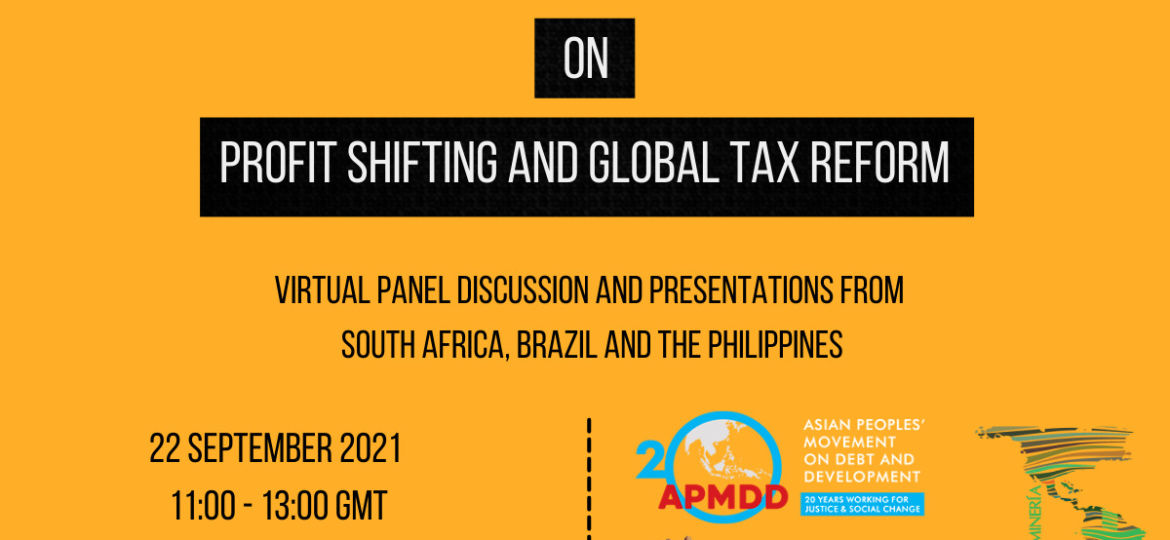
22 September 2021 | 11:00am GMT
Hosted by the: Alternative Information & Development Centre (AIDC), Churches and Mining Network (CaM), and Asian Peoples’ Movement on Debt and Development (APMDD)
Background and Context:
In the past few decades of neoliberal consensus, transnational corporations have enjoyed growing power over states, workers and citizens, especially in the global South. In practice, modern transnational corporations often sit in control of entire cross-border value chains, but on paper their operations are spread between a complex web of subsidiaries and sister companies. A growing number of corporations have abused these arrangements in order to maximize their profits, by shifting their flows of resources and revenues around avoiding paying taxes, wages, dividends to minor shareholders and fulfilling their social and environmental obligations.
Further complicating this is the fact that transnational corporations often enjoy close relationships with national elites, especially in the global South where their local partners often hold positions of power. These relationships may be leveraged in order to secure preferential treatment, or to enable outright corruption and money-laundering – as was the case in South Africa’s state capture/Gupta scandal.
There has been a growing recognition of the impact these outflows have; many countries are estimated to lose billions of dollars in possible tax revenue to these practices each year. For these countries, tackling this loss of revenues will be key to finance both a post-Covid recovery, as well as a just transition to a low-carbon economy.
It is arguably the United States’ own need to finance their infrastructure drive that has led to the present push for international tax reform under the OECD’s BEPS process. The proposals pushed forward under this process are aimed at tackling multinational profit shifting, but have been criticized for their plan to distribute the revenue largely to counties in the Global North, and especially in the OECD.
However, Global South countries, especially those with large extractive economies, experience the effects of corporate tax abuse differently from the members of the OECD. In countries like Brazil, South Africa, or the Philippines, where value is extracted from the ground and the labour of workers in the first place, profit shifting results in not only a loss of revenues needed for development, but also in wage evasion at the level of profit-shifting subsidiaries, which also use these schemes in order to avoid their commitments to communities. Global South countries therefore not only have a greater need for the resources lost to profit shifting, but also a greater claim to it than those countries who are advantaged by the OECD proposal.
What impacts do communities, workers, and countries in the Global South experience from profit shifting and IFFs? Why is it important for this perspective to be heard in the drive for international tax reform? And what civil society and popular movements from the Global South do in order to make sure they are heard?
Overview and Aims:
This webinar has three primary aims:
- To put forward a combined Global South perspective on profit shifting, tax and wage evasion from the perspectives of South Africa, Brazil and the Philippines. This will illustrate the effects of IFFs and BEPS on the Global South, as well as point to what we need international tax reform to do for us.
- To hold a conversation with the tax justice community, in order to discuss what can be done at the high level of reform so that our concerns can be addressed, and what the possible alternatives to the OECD process there are. This would be the start of a longer term process leading to the creation of a Global South platform.
- To emphasise the link between communities, movements, and partners who are involved with their own concrete struggles, and the larger scale issues of BEPS and international tax reform. This means that the inputs will emphasize the link between profit shifting and concrete issues facing e.g. mine-affected communities or mineworkers’ unions.
Format:
This webinar will be hosted live on the Zoom platform. Portuguese and Spanish interpretation will be available.
There will be four presentations, each of which will provide their perspective on their work as it relates to extractivism, profit shifting, tax and wage evasion. A panel of experts and activists tied to tax justice and the fight against illicit financial flows will respond to the presentations with their comments, followed by an open discussion.






